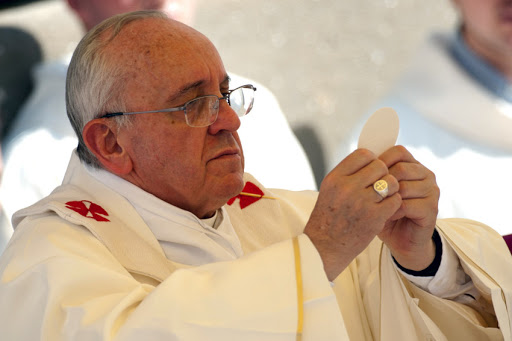Hope is not abstract, says Pope Francis, but rather something as concrete as a woman waiting for a child to be born. And wisdom consists in being able to rejoice in the “little encounters” on the path of hope.
This was Pope Francis’ reflection during his morning homily, where he reflected especially on two words from the days Readings: citizenship and inheritance.
The first Reading, from Ephesians, speaks about citizenship: “It is a gift that God has given us, making us citizens,” Francis said. It consists in having given us an identity, our “identity papers,” so to speak.
“You are fellow citizens with the saints,” in Jesus, he explained.
God is leading us on the journey toward the inheritance, secure in the knowledge that we are fellow citizens, and that God is with us. The inheritance, Pope Francis explained, “is that which we seek in our journey, that which we will receive in the end.”
And it is precisely hope which carries us forward in the journey toward that inheritance. Hope, he said, is “perhaps the smallest virtue, perhaps the most difficult to understand.”
Faith, hope, and charity are one gift. Faith and charity are easy to understand. “But what is hope?” the pope asked. It is hoping for heaven, hoping to encounter the Saints, eternal happiness. “But what,” he asked, “is heaven for you?”
Living in hope is journeying towards a reward, yes, toward a happiness that we do not have but we will have there. It is a difficult virtue to understand. It is a humble virtue, very humble. It is a virtue that never disappoints: If you hope, you will never be disappointed. Never, never. It is also a concrete virtue. “But how can it be concrete,” [you ask,] “if I don’t know heaven, or what awaits me there?” Hope, our inheritance which is hope directed towards something, is not an idea, it is not being in a good place… no. It is an encounter. Jesus always emphasizes this part of hope, this living in expectation, encountering.”
In the day’s Gospel, we hear of the encounter of the master when he returns from a wedding. An encounter is always something concrete. To illustrate this, Pope Francis gave a concrete example:
Something comes to mind, when I think of hope, an image: a pregnant woman, a woman expecting a child. She goes to the doctor, she sees the ultrasound. [Is she indifferent? Does she say,] “Oh look, a baby. Ok.” No! She rejoices! And every day she touches her belly to caress that child, in anticipation of that child, living in anticipation of that son. This image can help us understand what hope is: living for that encounter. That woman imagines what her son’s eyes will be like, what his smile will be like, whether he’ll be blonde or dark-haired… but she imagines meeting her son. She imagines meeting her son.
Read more:
How to pray with icons: A brief guide
The pope continued:
Do I hope like this, concretely, or is my hope a little dispersed, a little “gnostic?” Hope is concrete, it is an everyday thing, because it is an encounter. And every time we encounter Jesus in the Eucharist, in prayer, in the Gospel, in the poor, in the life of the community, every time we take another step toward this definitive encounter. [This is] the wisdom of knowing how to rejoice in the little encounters of daily life with Jesus, preparing for that definitive encounter.
In conclusion, Pope Francis emphasized once more that the word “identity” refers to our having been made one community; and the inheritance is the strength of the Holy Spirit that “carries us forward with hope.”
He called on those present to ask themselves how they live out their identity as Christians, whether they are expecting an inheritance in heaven that is somewhat abstract – or whether they are really hoping for an encounter with the Lord.
Read more:
Pope Francis: Faith is not a philosophy, but an encounter with Jesus Christ

